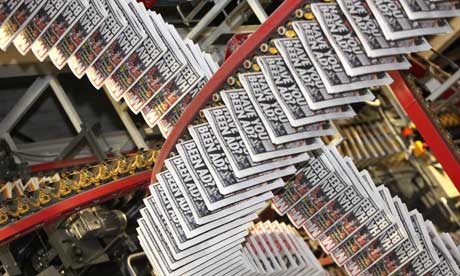
It is said that in 1787, the polemicist and prominent Whig Edmund Burke first made reference to the "illustrious nativity of the Fourth Estate" in a speech to the House of Commons. Though in context to our debates surrounding the place of journalism in British society, it is perhaps best to turn to Burke's contemporary Thomas Macaulay, who in reviewing Hallam's Constitutional History first made the case for the press as a system of accountability, stating: "The gallery in which the reporters sit has become a fourth estate of the realm."
Fast forward to 2013, and we have seen the most remarkable of transformations, as an institution whose modus operandi rests on independence becomes further compromised by the power of politics. As the Privy Council grants its royal charter on press regulation, accompanied by the Queen's seal of approval, the press will now have to face new obstacles when going about reporting.
The Sun's political columnist Trevor Kavanaugh has said of the new regulatory system: "If you put lipstick on a pig, it's still a pig", illustrating quite voraciously the difference in narrative between politicians and newspaper journalists. The former describe the Royal Charter as the 'best possible outcome' in abiding by Lord Leveson's recommendations which followed the Leveson Inquiry. The latter see it as sneaking statute, designed to give the political class more influence over the press, as Toby Young blogs on the Telegraph.
Both claims are exaggerated, but there still exists a potent danger. Indeed, the new system of regulation remains voluntary, but the fangs of the new regulatory model lie in the detail- in particular, the methods in which media organisations would be coerced into signing up to the Charter. In particular, this relates to the Crime and Courts act 2013 , which stipulates different treatments of media outlets depending on an 'approved regulator'. The snippet can be found in section 42, but I've posted the relevant segment here:
(3)For the purposes of subsection (2), a body is “recognised” as a regulator of relevant publishers if it is so recognised by any body established by Royal Charter (whether established before or after the coming into force of this section) with the purpose of carrying on activities relating to the recognition of independent regulators of relevant publishers.
(4)“Relevant claim” means a civil claim made in respect of any of the following—
(a)libel;
(b)slander;
(c)breach of confidence;
(d)misuse of private information;
(e)malicious falsehood;
(f)harassment.
The press have also suggested the charter is coercive on the basis that those who do not wish to join, such as Private Eye magazine, risk higher legal costs and exemplary pay-outs to claimants in the event that they are taken to court.
At the same time, the creeping authority of the charter is embedded in more discreet ways. Consider section 17 of schedule 3 under the stipulations of the charter:
17. The Board should not have the power to prevent publication of any material, by anyone, at any time although (in its discretion) it should be able to offer a service of advice to editors of subscribing publications relating to code compliance.
And when we consider in recent days that a number of high profile politicians, including the Prime Minister in which he posed a thinly vieled threat to The Guardian over it's NSA surveillance reporting, there is definitely a legitimate fear that politicians- and their interested affiliates, will be able to steer journalism at their own will.
A first reading of the charter illustrates not only the diminishing of the 'fourth estate' in its present state, but also the re-definition of journalism itself. What started as a legitimate inquiry into phone hacking and unethical practice- as well as legitimate debates regarding the strength of the Editor's code has instead become a battleground in which journalism is defined by the most powerful in society. Whether the press play by these new rules, or abstain completely is something we'll see in the coming few months, but I fear if they that satirical cover of Private Eye may instead become a haunting reality.
No comments:
Post a Comment